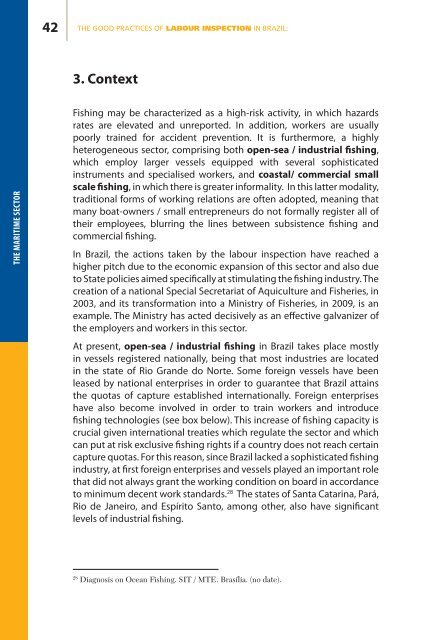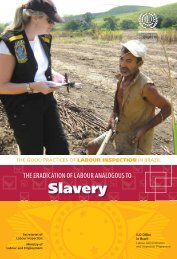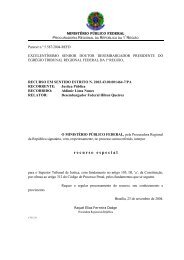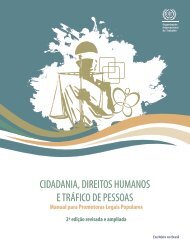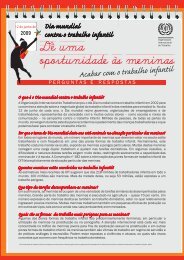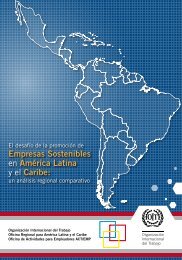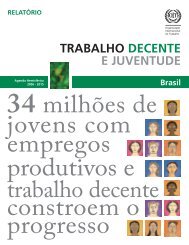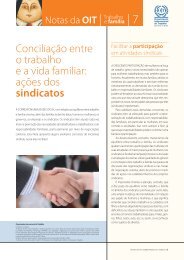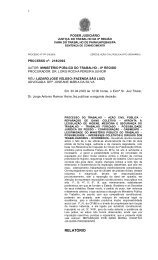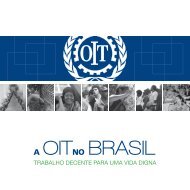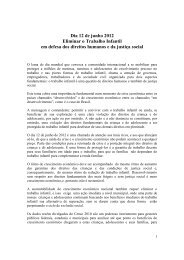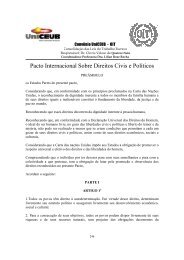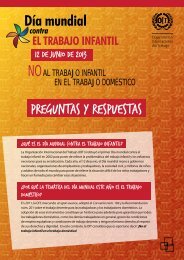The Maritime Sector
The Maritime Sector
The Maritime Sector
Create successful ePaper yourself
Turn your PDF publications into a flip-book with our unique Google optimized e-Paper software.
42THE GOOD PRACTICES OF LABOUR INSPECTION IN BRAZIL:3. ContextTHE MARITIME SECTORFishing may be characterized as a high-risk activity, in which hazardsrates are elevated and unreported. In addition, workers are usuallypoorly trained for accident prevention. It is furthermore, a highlyheterogeneous sector, comprising both open-sea / industrial fishing,which employ larger vessels equipped with several sophisticatedinstruments and specialised workers, and coastal/ commercial smallscale fishing, in which there is greater informality. In this latter modality,traditional forms of working relations are often adopted, meaning thatmany boat-owners / small entrepreneurs do not formally register all oftheir employees, blurring the lines between subsistence fishing andcommercial fishing.In Brazil, the actions taken by the labour inspection have reached ahigher pitch due to the economic expansion of this sector and also dueto State policies aimed specifically at stimulating the fishing industry. <strong>The</strong>creation of a national Special Secretariat of Aquiculture and Fisheries, in2003, and its transformation into a Ministry of Fisheries, in 2009, is anexample. <strong>The</strong> Ministry has acted decisively as an effective galvanizer ofthe employers and workers in this sector.At present, open-sea / industrial fishing in Brazil takes place mostlyin vessels registered nationally, being that most industries are locatedin the state of Rio Grande do Norte. Some foreign vessels have beenleased by national enterprises in order to guarantee that Brazil attainsthe quotas of capture established internationally. Foreign enterpriseshave also become involved in order to train workers and introducefishing technologies (see box below). This increase of fishing capacity iscrucial given international treaties which regulate the sector and whichcan put at risk exclusive fishing rights if a country does not reach certaincapture quotas. For this reason, since Brazil lacked a sophisticated fishingindustry, at first foreign enterprises and vessels played an important rolethat did not always grant the working condition on board in accordanceto minimum decent work standards. 28 <strong>The</strong> states of Santa Catarina, Pará,Rio de Janeiro, and Espírito Santo, among other, also have significantlevels of industrial fishing.28Diagnosis on Ocean Fishing. SIT / MTE. Brasília. (no date).


